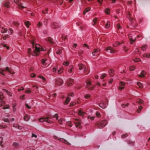A study published in the Journal of Immunology indicates that naturally occurring antibodies in the human immune system have the capacity to suppress inflammatory responses throughout the body.1 These antibodies may provide researchers an opportunity to develop new therapies for rheumatoid arthritis (RA) and other inflammatory conditions using similar pathways.
The lead researcher of this ongoing work, Gregg J. Silverman, MD, of the University of California, San Diego School of Medicine, is a recipient of an ACR Research and Education Foundation (REF) Within Our Reach: Finding a Cure for Rheumatoid Arthritis research grant.
We’re trying to bottle a little bit of Mother Nature that will help get people back into balance.
—Gregg J. Silverman, MD
“Following different clues, we have discovered that the human immune system contains naturally occurring antibodies that have the ability to down-regulate inflammatory response from the more primitive innate immune system,” Dr. Silverman says. “What this means is that this ancient innate part of our immune system is meant to respond dramatically, quickly, and vigorously to any kind of foreign threat. These are meant to attack infectious agents. The problem is when that same response becomes dysregulated and over-exuberant, it becomes one of the most destructive aspects of autoimmune diseases, including rheumatoid arthritis,” he notes.
“The good news,” continues Dr. Silverman, “is that these antibodies also can suppress inflammation. We think we can use these antibodies to provide a targeted approach to suppress inflammation by pathways that appear to be very similar to those of corticosteroids, which are the most commonly used immunosuppressive agents for rheumatic and inflammatory diseases.”
But unlike corticosteroids, potential therapies using these natural antibodies would be much less likely to have serious side effects.
“It’s absolutely unexpected that we’ve been able to show very powerful properties equivalent to the strongest doses of corticosteroids while using very low levels of these natural occurring antibodies,” Dr. Silverman says. “We’re trying to bottle a little bit of Mother Nature that will help get people back into balance.”
Support Research
To make a pledge or one-time donation to the REF for the Within Our Reach: Finding a Cure for Rheumatoid Arthritis campaign, visit www.rheumatology.org/REF. For more information about the Within Our Reach campaign and to read about the grant projects, visit www.WithinOurReach.info.
Dr. Silverman says that thus far this research has been focused primarily in mice, but the investigators have found remarkable parallels between the mouse immune system and the human immune system.
